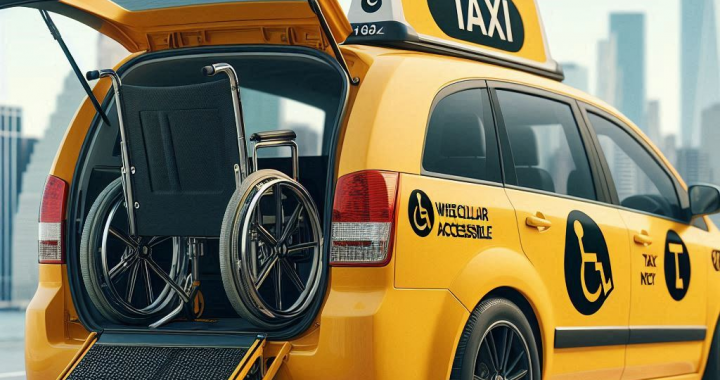The Taxi and Limousine Commission (TLC) has announced new rules that will eliminate the vehicle retirement dates for Wheelchair Accessible Vehicles (WAVs) effective from 7/20/24. This is a major development for the medallion industry and passengers in need of accessible service. The new rules mean that medallion owners can operate their WAVs for longer periods of time without having to purchase a new vehicle, as long as the vehicle continues to pass its scheduled TLC inspections. This will be a significant cost-saving measure for the medallion industry and a victory for the riding public in terms of increased WAV accessibility.
In addition to the elimination of vehicle retirement dates, the new rules also implement new accessibility standards for For-Hire Vehicles (FHVs). FHVs will now be subject to the same accessibility standards as those of accessible medallion vehicles. As of 7/20/24, any new FHV accessible vehicles must be on the approved vehicle list, which is available on the TLC’s website. The new accessibility standards will ensure that all passengers, regardless of their mobility needs, have equal access to transportation services.
Overall, the new TLC rules are a positive step towards improving accessibility and reducing costs for the medallion industry. The elimination of vehicle retirement dates for WAVs and the implementation of new accessibility standards for FHVs will benefit both passengers and medallion owners alike.
Overview of New TLC Rules
Elimination of Vehicle Retirement Dates for WAVs
The new TLC rules, effective from July 20, 2024, eliminate the vehicle retirement dates for Wheelchair Accessible Vehicles (WAVs). This means that medallion owners can now operate their WAVs for longer periods of time without having to purchase a new vehicle, as long as the vehicle passes its scheduled TLC inspections. This is a significant change that marks a new era for the medallion industry and passengers requiring accessible service.
Impact on Medallion Industry
The elimination of vehicle retirement dates for WAVs has a significant impact on the medallion industry. Medallion owners can now save money on vehicle-related costs, reducing the financial burden on their businesses. This change will also increase the lifespan of WAVs, which will help medallion owners to provide accessible service to passengers for a longer period of time.
Benefits for Passengers Requiring Accessible Service
The elimination of vehicle retirement dates for WAVs is a victory for passengers requiring accessible service. This change increases the availability of WAVs, making it easier for passengers to access accessible service when they need it. The new rules also implement new accessibility standards for For-Hire Vehicles (FHVs), subjecting them to the same accessibility standards as those of accessible medallion vehicles. Any new FHV accessible vehicles must be on the approved vehicle list, which is available on the TLC’s website.
Overall, the new TLC rules represent a significant change for the medallion industry and passengers requiring accessible service. The elimination of vehicle retirement dates for WAVs and the implementation of new accessibility standards for FHVs will increase the availability of accessible service, reduce the financial burden on medallion owners, and increase the lifespan of WAVs.
Operational Changes for WAVs
Extended Operation of WAVs
With the new TLC rules eliminating the vehicle retirement dates for Wheelchair Accessible Vehicles (WAVs), medallion owners will have the ability to operate their WAVs for longer periods of time without having to purchase a new vehicle, as long as the vehicle continues to pass its scheduled TLC inspections. This change is expected to bring a significant reduction in vehicle-related costs for medallion owners.
The extended operation of WAVs will also increase the availability of accessible service for passengers with disabilities. With the increased lifespan of WAVs, the riding public can expect to see more accessible vehicles on the road, providing much-needed transportation options for those who require them.
Scheduled TLC Inspections Compliance
Under the new TLC rules, medallion owners must ensure that their WAVs comply with the scheduled TLC inspections. The inspections will include checks on the vehicle’s mechanical condition, safety features, and accessibility features.
Medallion owners must also ensure that their WAVs are kept clean and in good working condition. Failure to comply with the scheduled TLC inspections may result in penalties, fines, or suspension of the medallion.
In summary, the new TLC rules eliminating the vehicle retirement dates for WAVs will bring significant operational changes for medallion owners. The extended lifespan of WAVs will increase the availability of accessible service for passengers with disabilities, while compliance with scheduled TLC inspections will ensure that the vehicles remain safe and accessible for all riders.
Accessibility Standards for FHVs
New Accessibility Requirements
As of 7/20/24, For-Hire Vehicles (FHVs) are now subject to the same accessibility standards as those of accessible medallion vehicles. FHVs must be equipped with a wheelchair accessible ramp or lift, and must meet the following requirements:
- The interior of the vehicle must have sufficient space to accommodate a passenger in a wheelchair.
- The vehicle must have securement devices to secure the wheelchair in place.
- The vehicle must have sufficient headroom to accommodate a passenger in a wheelchair.
- The vehicle must have a means of communication between the driver and passenger, such as an intercom or other device.
- These new accessibility requirements will ensure that passengers with disabilities have equal access to for-hire transportation services.
Approved Vehicle List for FHVs
As of 7/20/24, any new FHV accessible vehicles must be on the approved vehicle list, which is available on the TLC’s website. This list includes vehicles that have been tested and approved by the TLC for compliance with the new accessibility requirements.
Medallion owners and FHV bases should consult the approved vehicle list before purchasing a new accessible vehicle to ensure that the vehicle meets the new accessibility standards. Vehicles that are not on the approved vehicle list may not be used as accessible FHVs.
By implementing these new accessibility standards and an approved vehicle list for FHVs, the TLC is taking steps to ensure that passengers with disabilities have equal access to for-hire transportation services.



